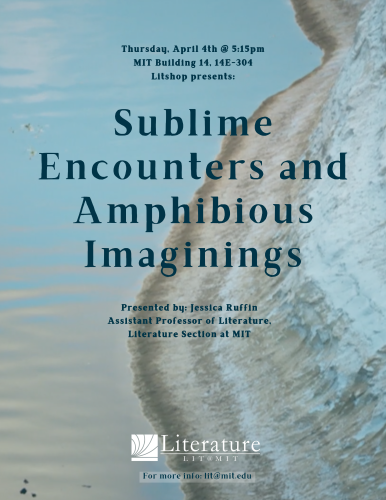Events

- This event has passed.
LitShop presents, Jessica Ruffin “Sublime Encounters and Amphibious Imaginings”
April 4 @ 5:00 pm - 6:00 pm
 Litshop is by invitation only.
Litshop is by invitation only.
Presented by: Jessica Ruffin
Assistant Professor of Literature, Literature Section at MIT
Abstract: The sublime, as figured by Immanuel Kant, is constituted by reason’s capacity to overcome an encounter with the unrepresentable and incalculable through a movement of abstraction. For rational subjects of Enlightenment, this movement of abstraction becomes a universal ground for an imagined community, attended by the pleasure of belonging. For those [subjects?] lacking Enlightenment, according to Kant, what would be sublime is only experienced as terror. This paper explores the legacy of Kant’s figuring of the sublime in white supremacist aesthetics and white epistemologies of race, space, and time. Carrying David Marriot’s concept of the abyssal into the sedimented coastlines of the Black Belt, this paper performs a media archaeology— interrogating the question of overcoming for the inassimilable subject of the infinite, ever-present terrors of white supremacy and anti-Blackness.
Bio: Jessica Ruffin is a critical philosopher, media historian, and moving-image enthusiast. Her research focuses on white supremacist aesthetics in post-Enlightenment German-language media and philosophy, as well as their legacies in popular culture, US film, and media theory. She has particular interest in how Arthur Schopenhauer’s and Friedrich Nietzsche’s engagements with counter-Enlightenment methods share poetic and temporal resonance with Black and Indigenous thought.
Literature Section
Massachusetts Institute of Technology
77 Massachusetts Avenue 14N-407
Cambridge, MA 02139
tel: (617) 253-3581
